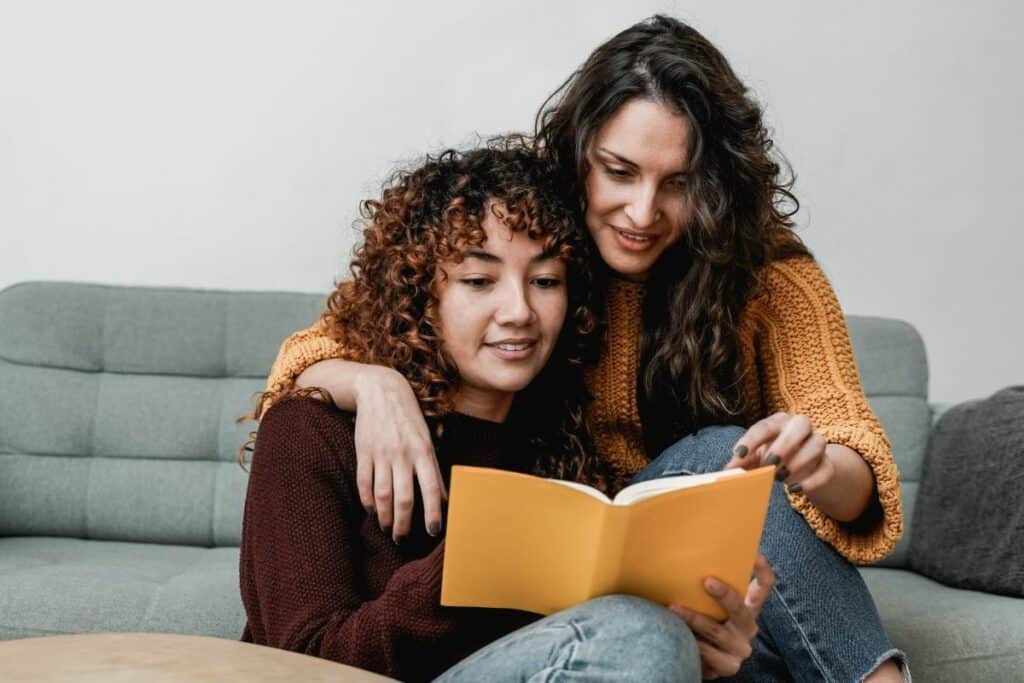Couples therapy exercises offer an effective way for partners to navigate their relationship challenges and strengthen their emotional bond.
These exercises are intended to help couples develop better communication, empathy, and understanding of each other’s needs.
By actively participating in these therapeutic activities, couples can identify areas of growth, promote intimacy, and ultimately enhance their overall relationship satisfaction.
Understanding Couples Therapy

Couples therapy is a form of treatment designed to help couples work through relationship issues and improve their emotional connection, communication, and problem-solving skills.
Therapists use various techniques and approaches to assist couples in achieving a better understanding of their relationship dynamics and addressing underlying issues.
Both partners participate in the treatment in couples therapy, with therapists acting as neutral mediators.
One of the primary goals of therapy is to develop more effective communication skills, which can positively impact relationship satisfaction and well-being.
Benefits of Couples Therapy
Couples therapy offers numerous benefits for individuals and their relationships.
Some of these benefits include:
| Benefit | Description |
|---|---|
| Improving Communication Skills | Couples therapy helps partners communicate more effectively, leading to a deeper understanding of each other’s thoughts, feelings, and needs. |
| Enhancing Emotional Intimacy | Through therapy, couples can identify and address emotional barriers, promoting increased emotional intimacy within the relationship. |
| Increasing Relationship Satisfaction | As couples work through issues together, they often experience an increase in overall relationship satisfaction. |
| Promoting a Healthier Dynamic | Couples therapy helps partners identify unhealthy patterns within their relationship and work together to establish healthier ways of interacting. |
| Support for Individual Growth | Couples therapy enables individuals to gain a better understanding of their own thoughts and feelings and fosters personal growth, ultimately benefiting the relationship. |
The benefits of couples therapy can contribute to overall well-being and a more fulfilling relationship.
Essential Couples Therapy Exercises

Couples therapy exercises play a critical role in helping partners navigate their challenges and strengthen their relationships.
By skillfully addressing the individual and shared issues both partners face, couples can grow together and face the future with greater resilience and a deepened connection.
Communication Exercises
Effective communication is essential for resolving relationship issues and maintaining a healthy bond between partners.
Couples therapy exercises can help improve communication skills and promote better understanding between partners.
| Exercise | Description |
|---|---|
| Reflective Listening | This technique requires one partner to listen attentively to the other’s words and then repeat what they believe the speaker has said, allowing for clarification and deeper understanding. This exercise can help couples develop listening skills and foster empathy. |
| Sharing Appreciations | In this exercise, partners take turns expressing their gratitude towards each other for specific actions or qualities. This can help strengthen emotional intimacy and positive communication between partners. |
Problem-Solving Exercises
Couples inevitably face disagreements and conflicts, but learning to resolve them constructively is crucial for a lasting relationship.
| Exercise | Description |
|---|---|
| Problem-Solving Session | In this exercise, each partner takes time to express their concerns and feelings about a specific issue, brainstorm possible solutions, and mutually agree upon a course of action. This approach can help couples resolve disagreements efficiently and minimize adversarial interactions. |
| Coping as a Team Strategy | This exercise encourages partners to view conflicts as shared challenges and work together to find solutions, emphasizing teamwork and collective effort. This can help couples face adversity collaboratively and strengthen their relational bond. |
Connection-Building Exercises
To maintain a strong relationship, couples must continuously cultivate emotional and physical intimacy.
| Exercise | Description |
|---|---|
| Rituals of Connection | These are deliberate acts that remind partners of their bond and create moments of quality time. Examples of rituals can include a weekly date night, a shared hobby, or even a regular morning walk together. |
| Physical Touch | Exercises such as Hugging or Holding Hands can help couples strengthen their physical intimacy and convey affectionate feelings. These gestures do not necessarily have to lead to sexual activities but can help to maintain the emotional closeness between partners. |
Strategies for Enhancing Trust and Satisfaction

Trust and satisfaction form the bedrock of any successful relationship.
These essential elements are like the glue that holds the bonds between individuals together, fostering mutual respect, emotional safety, and a sense of fulfillment.
Building and Rebuilding Trust
Trust is the foundation of any healthy relationship.
One effective trust-building exercise is to have both partners share and discuss their personal values, beliefs, and commitments.
This can foster understanding and reveal commonalities that can reinforce the bond between partners.
Another exercise involves expressing appreciation and gratitude for each other’s strengths and positive qualities, which helps partners feel more connected and secure.
Couples struggling with trust issues might consider seeking professional guidance through marriage counseling to address their concerns.
Improving Relationship Satisfaction
Enhancing relationship satisfaction often involves focusing on the positive aspects of the partnership.
One approach is to introduce rituals of connection, such as spending quality time together, engaging in shared activities, and showing physical affection daily.
Incorporating positive psychology techniques can also be beneficial, such as creating a vision board as a visual representation of shared values, goals, and dreams.
This helps reinforce a shared vision and encourages open communication to improve satisfaction.
Maintaining Healthy Relationships
To maintain a healthy relationship, couples should invest in developing relationship skills such as active listening, empathy, and conflict resolution.
Consistently addressing and assessing the costs and rewards associated with the relationship can help identify areas of improvement and foster long-term satisfaction.
Participating in marriage counseling or attending workshops on relationship skills can be a valuable step in cultivating healthy, lasting partnerships.
Resources for Continuing Therapy

Several resources are available for couples to continue their therapeutic journey.
Worksheets, tools, and attending workshops provide opportunities for partners to learn, grow, and strengthen their bond.
Couples can work towards a healthier, more fulfilling relationship by actively engaging in these practices.
Therapy Worksheets and Tools
There are various worksheets and tools available for couples who want to continue working on their relationship outside of therapy sessions.
One popular option is the collection of icebreaker questions, which can be utilized to foster more open and engaging conversations between partners.
Icebreakers can focus on topics such as emotions, past experiences, and future aspirations.
Additionally, oxytocin, known as the “love hormone,” is an essential factor in forming emotional bonds in relationships.
Couples can explore exercises and activities that stimulate oxytocin release, such as hugging, touching, and active listening, further enhancing their connection.
Therapists Specializing in Relationship Issues
Workshops and Events
Attending workshops and events can be a valuable addition to couples therapy and an effective way to develop new skills together.
These experiences provide opportunities for both learning and practicing therapeutic techniques in a supportive and guided environment.
Multiple organizations and professionals offer workshops tailored to relationships, focusing on various aspects such as communication, trust, intimacy, and conflict resolution.
Couples can choose workshops based on their goals and areas in which they would like to improve.
Frequently Asked Questions

What are effective communication exercises for couples?
Effective communication exercises for couples can involve practicing active listening, sharing feelings openly, and asking open-ended questions.
One helpful exercise is the “mirroring” technique, where one partner shares a thought or feeling, and the other partner repeats it back to them, ensuring they understand correctly.
Using “I” statements instead of “you” statements can also improve communication by reducing blame and accusation.
What is the 40-20-40 process in couples therapy?
The 40-20-40 process in couples therapy is a communication exercise that divides the conversation into three parts, with each partner speaking for 40% of the time and the remaining 20% spent on reflection and clarification.
This method encourages attentive listening and helps ensure both partners have equal opportunities to express their thoughts and feelings.
Which exercises can help strengthen trust between partners?
To strengthen trust between partners, try exercises that promote vulnerability and openness, such as sharing personal fears, past experiences, or goals.
Encourage regular check-ins to discuss emotional well-being and relationship satisfaction.
Practicing consistency, honesty, and reliability can also foster trust over time.
How to find a licensed couples therapist?
Finding a licensed couples therapist involves a systematic approach to ensure you receive quality and professional care.
Here are steps to help you locate a licensed couples therapist:
- Determine Your Needs: First, identify your specific needs and goals for therapy as a couple. Knowing what you want to address, whether it’s communication issues, conflict resolution, intimacy problems, or other concerns, will help you find a therapist with the right expertise.
- Check Your Insurance: If you have health insurance, contact your insurance provider to get a list of in-network therapists. This can help you narrow down your options and make therapy more affordable.
- Ask for Referrals: Reach out to friends, family members, or trusted healthcare professionals for recommendations. Personal referrals can provide valuable insights into therapists who have helped others in similar situations.
- Online Directories: Utilize online therapist directories like Find-a-Therapist, Psychology Today, or GoodTherapy. These directories allow you to search for licensed couples therapists by location, specialization, and insurance.







